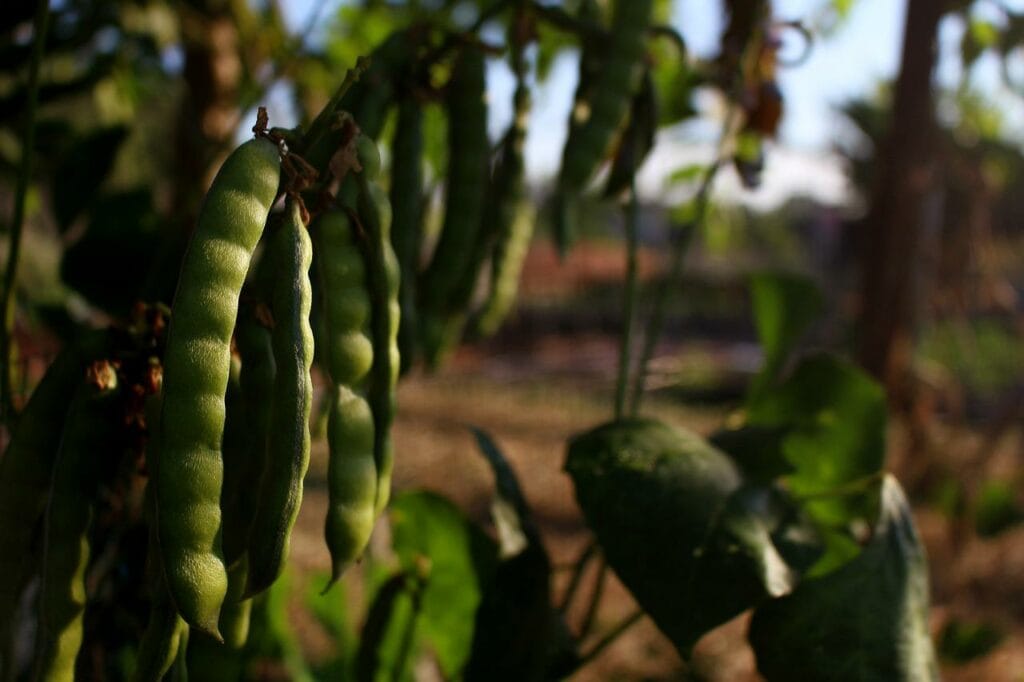10 Best Types of Bean Plants to Grow at Home (With Pictures)
-
Codee Chessher
- Last updated:

Beans get a bad rap for their effects on your digestive system, but they’re one of the best vegetables to grow at home. They provide tons of protein and vitamin B, making them the best replacement for meat in meals. There are so many types of beans to explore, but let’s start with the ones below.

The 10 Best Types of Bean Plants to Grow at Home
1. Black Beans
| Type: | Bush and pole |
| Grow time: | 90–140 days |
Black beans are technically classified as legumes because of their hard shell, but we know them as beans. They provide protein, vitamins, minerals, and fiber, which makes them among the most nutrient-dense foods. They’re considered a dry bean and have both bush and pole varieties, so you can choose which you prefer to grow.
2. Lima Beans
| Type: | Bush or pole |
| Grow time: | 65–100 days |
Lima beans get a bad rap for their off-putting texture, but they’re also known as the butter bean for their subtly rich flavor. Lima beans can be grown as bush or pole beans, with the former taking a mere 65 days to yield beans. These do better in a cool climate, but you can plant them outside in warm weather too.
3. Edamame

| Type: | Bush |
| Grow time: | 90–150 days |
Also called soybeans, edamame has quickly become a large-scale agricultural crop, but you can grow it at home as well. Rather than allow the beans to dry, soybeans are picked while green and immature for cooking. Edamame is used to create soy sauce, soy milk, and soy milk. These are pretty easy to grow because pests don’t like them and they can tolerate a wide range of climate conditions.
4. Fava Beans
| Type: | Pole |
| Grow time: | 80–100 days |
Also called field or broad beans, fava beans are a cool season legume native to parts of the Middle East. Fava beans grow up to 6 feet, developing striking white and purple spotted flowers. You can pick the beans while they’re green and young or leave them on the plant to dry and store. Fava beans need moist soil at all times, so make sure to water them regularly.
5. Asparagus Beans
| Type: | Pole |
| Grow time: | 75 days |
Native to Southeast Asia, asparagus beans go by several other names like the yard-long bean or Chinese long bean. These are prized for their flavor and size. Plus, they’re remarkably heat tolerant for a bean. Asparagus beans are best enjoyed while the beans are immature because leaving them on the plant will cause them to become very starchy and fibrous.
6. Kidney Beans
| Type: | Bush or pole |
| Grow time: | 100–140 days |
Kidney beans are a valuable source of vegetable protein in Central America, growing well in warm and wet conditions. They don’t, however, like persistently wet soil, and you should allow it to dry out fully before rewatering. Kidney beans can be grown as bush or pole beans, and both varieties require a lot of sunlight to thrive and produce well.
7. Runner Beans
| Type: | Pole |
| Grow time: | 12–16 weeks |
Also used as ornamental plants for their striking flowers, runner beans have a very long growing time but a huge size. Some types are smaller, but runner beans tend to grow from 6–15 feet. Runner beans are beloved among gardeners because pollinators flock to them. Most runner beans fare well in warm weather, but they actually hail from a cool mountainous region in Central America.
8. Green Beans
| Type: | Bush or pole |
| Grow time: | 50–60 days |
Green beans are one of the most well-known varieties of beans in the US. They are easy to grow and produce large quantities, giving you a bountiful yield. They prefer slightly acidic soil but really need 8 hours of direct sunlight to do well. Better yet, they are ready to harvest in 50–60 days.
9. Pinto Beans
| Type: | Bush and pole |
| Grow time: | 75–100 days |
Pinto beans are one of the most well-known beans and are particularly beloved in the Southern US and Latin America. Pintos love arid climates and tolerate heat fairly well, which makes sense since they hail from Mexico. These beans have a very dense nutritional content and are one of the most important vegetable proteins.
10. Navy Beans
| Type: | Pole |
| Grow time: | 85–100 days |
Navy beans are one of the smaller pole beans, only growing up to a foot in length. To compensate for this, plant five to six seeds in small mounds at least 3 inches away from each other. Each mound will sprout several vines that will climb a trellis. Navy beans need a lot of water to thrive and stay free of disease.

Conclusion
Beans are a tasty plant you can grow at home yourself, and they make a great meat replacement for vegetarians or vegans. Many types of beans have a bad reputation, but don’t be fooled! Try growing some of the beans listed in this article yourself and find out how delicious they can be.
Featured Photo Credit: Thảo Trương Thị Phương, Pixabay
Contents
